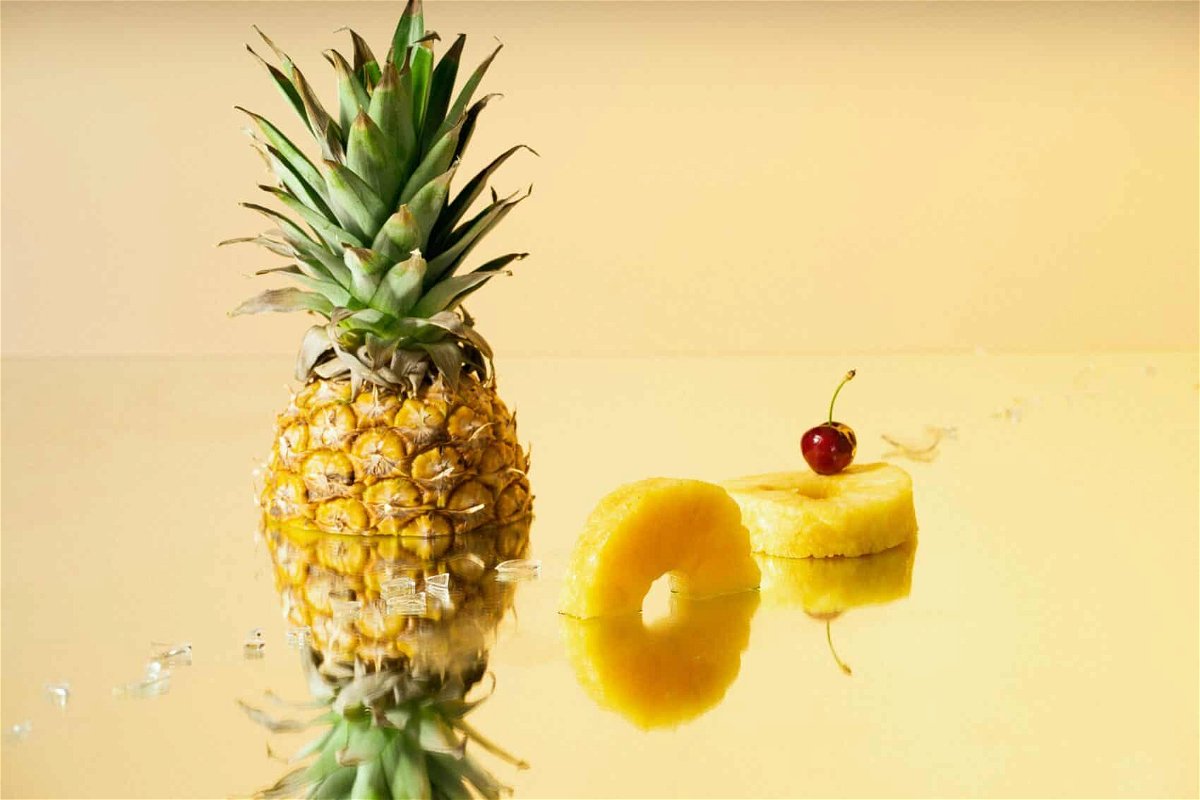We're an affiliate
We hope you love the products we recommend! Just so you know, we may collect a share of sales or other compensation from the links on this page at no additional cost to you. Thank you if you use our links, we really appreciate it!
Can dogs eat pineapple? The answer is yes. Pineapples are among the safe fruits that you can give to your dog.
Dogs love eating fruits almost as much as they love eating their main foods. And with so many benefits of different fruits, it’s good for their health and diet.
However, with so many fruits out there, it can be a little confusing to know which ones are safe for your pooch, and how much you need to give them.
In this article, we’ll talk about how safe pineapples are to dogs, their pros and cons, and the best ways to feed them to your pup.
Is Pineapple Good for Dogs
Pet parents are always looking for better ways to feed their dogs with fruits to get the most benefits. Some of these options include sneaking them into baked dog foods and even hiding them in ice cream.
Pineapples are safe for dogs; they are delicious and nutritious too. However, you need to make sure your dog isn’t allergic to the fruit.
If they are, they may get an upset stomach or diarrhea after taking it. Take a look at the best foods you can give your sick dog for quicker recovery.
If you’re in doubt, always start with small pineapple pieces and gradually increase the frequency over time as you observe any signs of allergic reactions.
As long as your dog doesn’t have any allergies or digestive issues, pineapples are generally safe for them to eat.
Some dogs may have issues breaking down the sugars in the pineapple, so it’s best to be sure of what you are dealing with.
9 Benefits of Pineapple for Dogs
If you are wondering what happens if a dog eats pineapple, then read on to find out some of the benefits.
- Ripe pineapples are packed with vitamin C which helps support the immune system, prevents scurvy, and even smoothes your dog’s skin and coat.
- They are packed with some antioxidants that help protect the body against free radicals which might cause cancer.
- Pineapples also provide a good amount of vitamin B complexes, which are great for the heart and the nervous system. They’re especially helpful for older dogs and those with neurological disorders.
- Pineapples are rich in minerals including manganese, potassium, and phosphorus. These help the dogs to develop strong bones, connective tissues, and the regulation of blood sugar in the body.
- A ripe and fresh pineapple has high water content hence it will keep your dog hydrated.
- Pineapple is a healthy fruit and has very few calories, making it a good option for overweight dogs.
- Pineapples contain bromelain, an enzyme that can help break down protein hence making it easier for dogs to digest complex proteins.
- Pineapples also contain quercetin (a flavonoid), which has been shown to have anti-inflammatory properties that may suppress joint pain. This makes them great for dogs with arthritis or other bone problems.
- Pineapple contains four types of dietary fiber which are all necessary to maintain digestive health. The four main dietary fibers are cellulose, hemicellulose, pectin, and lignin.
Cellulose is responsible for chewing and swallowing food. Hemicellulose helps with the absorption of water into the body.
Pectin is a soluble fiber that helps with stool formation. Lignin is a structural component of plants that acts like a glue to hold cells together in the body.
Dietary fiber also helps lower cholesterol levels in the dog’s bloodstream while maintaining regular bowel movements throughout the day.
5 Disadvantages of Pineapple for Dogs
There are a few risks that are associated with pineapples for dogs. Here are some of them that you should keep in mind:
- Pineapples have a high sugar content and can cause severe metabolic issues in dogs if taken in excess. Too much sugar consumption can lead to insulin imbalances, which can result in insulin resistance, diabetes, fatty liver disease, and hyperglycemia If your dog has a sensitive stomach, you may want to avoid feeding pineapple altogether. Don’t miss out on the best foods for dogs with an upset stomach.
- The prickly exterior skin of the pineapple can give your dog an injury. Make sure to fully peel the fruit before giving it to your dog.
- Pineapple can cause gas when taken in large quantities, and this can be uncomfortable for your pup. So, make sure to minimize the amount of pineapple your dog eats at first. After a couple of days, you can try adding more if necessary.
- Pineapples are acidic and can corrode your pup’s teeth enamel if taken in large quantities. These might spring other dental issues that may give your pooch a harder time eating or chewing. The acidity might also cause an upset stomach in some dogs.
- Finally, some dogs may be allergic to pineapple, causing them to have a rash or itching skin. If your dog develops any of these symptoms after eating pineapple, you should discontinue feeding the fruit and seek veterinary care.
Can Puppies Eat Pineapple?
It is not recommended to feed your puppy pineapple because of its high sugar content. The sugars can cause diarrhea, or lead to obesity which increases the risk of several other health issues.
If you want to feed your puppy pineapple, make sure that you pick the low-sugar variety. You could also dilute pineapple juice and use it as a food topping for your puppy’s food.
Another way to give it to your puppy is by making a smoothie using pineapple and other safe fruits for dogs that are low in sugar.
How Much Pineapple Can I Give My Dog?
A small piece of fresh pineapple cube (about 1 inch x 1 inch x ¼ inches) once or twice a day would be enough for your dog to enjoy the benefits of this healthy fruit without causing any harm to their health.
You could also mash the pineapple and give your dog a teaspoon daily.

And always consult with a nutrition vet if you want to make it a regular part of your pup’s diet.
Frequently Asked Questions
Can dogs have pineapple cores?
Although the pineapple core has some vitamins and other nutrients, it is best NOT to give it to your dog.
The core is mostly indigestible and not convenient for dogs. This presents choking hazards and may cause your dog to have bowel obstruction among other related complications.
Is Pineapple Juice Good for Dogs
While feeding your dog a sliced pineapple is the best way to get the full benefits, pineapple juice can be a nice alternative.
It’s also more convenient since you can easily add it to your dog’s drinking water rather than giving it plainly to your dog.
You can use pineapple juice to sweeten some of your dog’s foods or even use it to make some homemade treats.
However, you need to be careful because highly concentrated pineapple juice has too much sugar and lacks dietary fiber hence it might cause diarrhea.
Fresh or canned pineapple?
Canned pineapple contains too much sugary syrup which can be dangerous for dogs. This might upset your dog’s stomach and cause other health problems in your dog. It is best to give your dog a fresh pineapple instead of a canned one.

In addition to that, canned pineapple may contain chemical preservatives which might be toxic for dogs.
What other fruits are safe for dogs?
If your dog does not like pineapples, there are plenty of other healthy fruit snacks that your dog will enjoy. Here are the other good fruits for dogs:
- Strawberries
- Cranberries
- Raspberries
- Olives
- Blueberries
- Bananas
- Cantaloupes
- Apples
- Peach
- Plums
- Guava
- Papaya
- Mango
- Kiwi
- Watermelon
Fruits that are not safe for dogs
The following fruits are classified as toxic for dogs and are therefore not safe for them.
The Bottomline
Can dogs have pineapple? Yes, it’s a delicious and nourishing fruit for them. You can also use it in other recipes, like making homemade dog treats, and smoothies, and spicing up your dog’s food with dilute pineapple juice.
If your dog doesn’t have sensitive stomach issues, feeding them pineapple is a great way to boost their nutritional intake.
Keep in mind that even though dogs can eat pineapple, this shouldn’t be a major part of their diet. Well-balanced dog food should make up 90% of your dog’s diet and the remaining 10% is for dog treats.
Laura is the founder of Furs'n'Paws. She is a also a pet writer and expert with more than 20 years of experience of working with dogs and cats. She developed a very strong love for animals at a young age. Her passion led her to establish a thriving pet sitting and dog walking business in Dubai. As an expert in pet training, behavior, and nutrition, Laura is committed to helping pet owners and pet lovers by offering high-quality information on a wide range of topics.



No responses yet